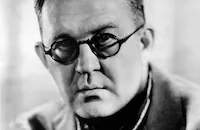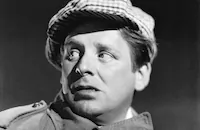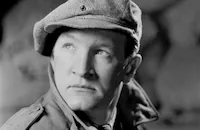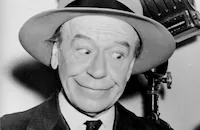The Informer

Brief Synopsis
Cast & Crew
John Ford
Victor Mclaglen
Heather Angel
Preston Foster
Margot Grahame
Wallace Ford
Film Details
Technical Specs

Synopsis
In 1922, in the strife-torn streets of Dublin, Gypo Nolan, a poor, lumbering goliath, sees a "wanted for murder" poster of his best friend, rebel Frankie McPhillip, that promises a twenty-pound reward for information leading to Frankie's arrest. Although broke and hungry, Gypo suppresses his interest in the poster, until his girl friend, prostitute Katie Madden, berates him in frustration for their poverty. Spurred on by Katie's longing for passage to America, Gypo enters the headquarters of the British army and reveals that Frankie, whom he has just seen, is at Frankie's mother's house. After Frankie is killed in front of his mother and sister Mary, Gypo collects his reward money and finds his way to a pub. There, he explains to Katie that he acquired his newfound wealth by robbing a drunken American sailor. Gypo then shows up at Frankie's wake, where his edgy, defensive behavior and collection of coins arouse suspicion in some members of the Irish rebel army, which had ousted him earlier for failing to carry out an execution. To test their suspicions, the rebels take Gypo to see Dan Gallagher, the commandant of the underground army, who tells Gypo that if he reveals the name of the informant, he will be reinstated in the group. Eager to prove himself, Gypo blurts out the name of tailor Pat Mulligan and then invents a revenge motive for him. Dan, who is anxious to rout out the traitor, agrees to investigate Gypo's accusations at a meeting to be held later that night. Before the meeting, a now drunken Gypo is befriended by Terry, an opportunistic conman, who encourages him to spend his £20 buying food and drink for strangers. Dan, meanwhile, questions Mary about Frankie's fatal visit, and she reveals that Frankie had mentioned seeing Gypo just before coming home. Armed with this information, the rebels find a reeling, nearly broke Gypo in an "after hours" club and escort him to the meeting. After questioning a befuddled Mulligan, the rebels turn on Gypo, who finally admits his deed. Unmoved by Gypo's protests that he didn't know what he was doing, the rebels lock him up and draw straws for his execution. Desperate, Gypo breaks out of his cell and runs to Katie, who hears his tearful confession of betrayal. Filled with her own guilt, Katie goes to Dan and begs for Gypo's life, but discloses his whereabouts in the process. While sleeping in front of Katie's fireplace, Gypo is besieged by the vengeful rebels and shot. The wounded Gypo staggers to a nearby church and makes a dying confession to Frankie's grieving mother. As Gypo collapses for the last time at the foot of the altar, Frankie's mother forgives him.

Director

John Ford
Cast

Victor Mclaglen

Heather Angel

Preston Foster

Margot Grahame

Wallace Ford

Una O'connor

J. M. Kerrigan

Joseph Sauers
Neil Fitzgerald

Donald Meek
D'arcy Corrigan
Leo Mccabe
Gaylord Pendleton
Francis Ford
May Boley
Grizelda Harvey

Denis O'dea
Clyde Cook

J. Farrell Macdonald
Major Sam Harris
Earle Foxe
James Murray
Frank Moran
Arthur Mclaglen
Barlowe Borland
Crew
Joseph H. August
John Ford
George Hively
Charles Kirk
S. Barret Mccormick
Hugh Mcdowell Jr.
Elizabeth Mcgaffey
Thomas Moore
Dudley Nichols
Ed O'fearna
Liam O'flaherty
Walter Plunkett
Van Nest Polglase
Cliff Reid
Max Steiner

Photo Collections
Videos
Movie Clip




Trailer
Hosted Intro
Film Details
Technical Specs

Award Wins
Best Actor
Best Director
Best Score
Best Writing, Screenplay
Award Nominations
Best Editing
Best Picture
Articles
The Informer
In 1922, in the strife-torn streets of Dublin, Gypo Nolan (Victor McLaglen), a poor, lumbering goliath, sees a wanted poster of his best friend, rebel Frankie McPhillip (Wallace Ford) that promises a hefty reward for information leading to Frankie's arrest. Broke, hungry, and longing for an escape to America, Gypo seeks out the British army and betrays his friend and comrade. After Frankie is killed in front of his mother and sister, Gypo collects his reward money and begins a long journey into a night filled with guilt, remorse, and ultimately, some kind of redemption, all with an Irish flavor. [Martin Scorsese references The Informer in his own statement on Irish guilt and betrayal in The Departed (2006).]
The film is based on Liam O'Flaherty's novel, the rights of which were purchased by RKO for $2,500. Ford had wanted to film O'Flaherty's novel as early as 1930, but RKO thought the subject matter entirely unappealing. The fact the novel had already been adapted as an unsuccessful British film in 1929 did not help Ford in convincing RKO otherwise. The studio brass simply thought the tale was too dark, too grim, too common. But the studio hesitantly agreed, after Ford and screenwriter Dudley Nichols wrote the first and, according to Nichols, only draft of the script, in six days during a cruise on Ford's sailboat, the Araner.
+ Nichols, one of Ford's most important collaborators, found the pre-production process of The Informer to be wholly unique. As Ford scholar Lindsay Anderson recounts, Nichols said, "I had of course been mulling the story for a long time, and was full of it, had been gathering ideas as to how to do it. I had a few talks with Ford beforehand, but nothing specific was discussed. Then we had one fruitful session together with Max Steiner, who was to write the music; Van (Nest) Polglase, who was to do the sets; Joe August, the cameraman; and a couple of technicians. This, to my mind, is the proper way to approach a film production-and it is, alas, the only time in 25 years I have known it to be done: a group discussion before a line of the script is written."
Still, many higher-ups in RKO regarded The Informer as "dramatically pointless and commercial suicide." Fortunately for Ford, he had an ace in the hole within RKO's management-associate producer Cliff Reid. The tenacious Reid championed Ford and more importantly, Ford's ambitions. When RKO would question whether or not the story suffered from dramatic anemia, Reid would argue, "Never mind the story: just keep concentrating on we got the best damn director in Hollywood working for us. F-O-R-D. Ford."
RKO wanted Richard Dix in the role of Gypo Nolan, the title role informer. Ford adamantly resisted. He had Victor McLaglen, his star from The Lost Patrol (1934), in mind for the role all along. According to film scholar John Baxter, McLaglen was "the personification of noisy, violent, drunken but lovable Ireland, and based, Ford acknowledges, on his own father." McLaglen wasn't even Irish (the only authentic Irishman in the cast was J.M. Kerrigan, playing Terry, the hanger-on who helps Gypo squander his blood money). He was English. He was a boy soldier in the Boer War and a prizefighter (who once went six rounds with Jack Johnson) before he became an actor. McLaglen made a total of twelve films for Ford, including The Quiet Man (1952), another film for which Ford won the Oscar® for Best Director. The total number would be thirteen if one counted What Price Glory (1926), a picture that McLaglen starred in, with a few scenes directed by Ford. But McLaglen breaks the heart with his performance as the blustery, bruising simpleton, who can not fully comprehend the consequences of his actions.
For his performance, McLaglen was awarded the Academy Award for Best Actor. It was later suggested that Ford "tricked" McLaglen into getting drunk for several key scenes, specifically the scene where Gypo is being interrogated. The story goes that Ford told McLaglen to should tie one on after shooting wrapped one day, since he wasn't needed for the next day's shooting. So when the morning came, McLaglen was surprised to be ordered to the set, looking haggard and hung-over. It was in this state, supposedly, that McLaglen performed the climactic interrogation scene. However, McLaglen's son, Andrew, strenuously denied that his father would perform any scene while inebriated. And Ford himself, years later, admitted that "there is an axiom in the picture business that nobody under the influence of alcohol can play a drunk. And I believe that...You can't play a drunk while you're under the influence. Victor had to run too many gamuts of emotion, bravado, nervousness, fear sometimes all in one scene, and go back to bravado again and resume the whole thing. He had too much to do to take a drink."
To keep RKO happy, The Informer was kept on a tight budget and a tighter schedule: about $243,000 and just under 20 days. The relatively cheap budget and lightning fast pace give Ford an interesting challenge, one that would be taken up by independent filmmakers in the future: how to make a compelling motion picture with very little money and time. What Ford did make was something RKO never intended: a highly personal art picture, and he did it on time and on budget. The film became RKO's most prestigious production for years. When it was first released, The Informer was not a breakout hit. It took a little time, helped by rapturous reviews, for the film to become a financial success and, more importantly, justification that John Ford was at the top of his game and one of Hollywood's greatest filmmakers. In addition to McLaglen's Oscar®, The Informer also earned Ford his first of six Oscar®s, and Max Steiner won for Best Score. Dudley Nichols received the Oscar® for Best Screenplay, but Nichols refused it, out of loyalty for his fellow writers, who had left the Motion Picture Academy over union issues. The film was also nominated for Best Picture, but lost to The Mutiny on the Bounty (1935).
As Ford biographer Scott Eyman notes in his book Print the Legend: The Life and Times of John Ford, "The Informer gave (Ford) a critical reputation he would never entirely lose and bestowed upon him a leader's role within the industry." The experience also resulted in a long friendship with Liam O'Flaherty. The novelist dedicated Famine, his next novel, to Ford.
Producer: John Ford, Cliff Reid
Director: John Ford
Screenplay: Dudley Nichols, Liam O'Flaherty (novel)
Cinematography: Joseph H. August
Film Editing: George Hively
Art Direction: Van Nest Polglase
Music: Max Steiner
Cast: Victor McLaglen (Gypo Nolan), Heather Angel (Mary McPhillip), Preston Foster (Dan Gallagher), Margot Grahame (Katie Madden), Wallace Ford (Frankie McPhillip), Una O'Connor (Mrs. McPhillip).
BW-92m. Closed captioning.
by Scott McGee

The Informer
Informer, The - Victor McLaglen in John Ford's THE INFORMER on DVD
Moviegoers were less enthusiastic-the film's domestic gross was only a little higher than its $215,000 budget - and while Ford himself was strongly committed to the project, he wasn't very keen on how it turned out, telling critic Lindsay Anderson in 1950 that it came "a long way down the list" of his personal favorites. "It lacks humor - which is my forte," he later told Peter Bogdanovich.
Ford was right about the film's humorless mood, but the story-based on a novel by Liam O'Flaherty, an Irish author with Marxist politics--doesn't exactly cry out for lighthearted treatment. Set in Dublin in 1922, it centers on Gypo Nolan, a lunkheaded Irishman who's somehow gotten involved with the Sinn Fein rebellion against British rule. Tossed out of the rebel group and addled by romantic dreams of escaping to America with his prostitute girlfriend, he walks into a police station and informs on a close friend (Wallace Ford) to collect the reward. The friend then dies in a shootout with the cops. Stabs of conscience (what have I done?) and pangs of paranoia (will the IRA find out?) attack Gypo immediately, pushing him into a nonstop psychological slide. The movie's style mirrors his deteriorating state, wrapping scene after scene in murky fog and offering glimpses of the delirious visions that invade Gypo's suffering, whiskey-dazed mind. The plot culminates in a late-night IRA council meeting called to determine The Informer's identity and eliminate him so he can't cause additional damage. Among those present are Gypo, the sister (Heather Angel) of the rebel he squealed on, and a meek tailor (played by Donald Meek, fittingly enough) whom Gypo has falsely accused of being the squealer.
It's easy to imagine The Informer as a hard-hitting suspense drama, but Ford takes it in a different direction, leaving little doubt that Gypo's disloyal deed will catch up with him and bring him down. As early as the opening credits we see his silhouetted figure with arms outstretched as if he were being crucified, and the fogbound images shot by cinematographer Joseph H. August, reflecting Ford's fascination with German Expressionist film, are consistently ominous. Ford favors psychological anxiety over narrative tension at every opportunity, so that despite its heavy dose of Christian symbolism - the finale takes place under a looming crucifix in a cathedral, underlining themes of forgiveness and redemption-the film's effect is closer to Greek tragedy, where the outcome is never in question and interest lies less in what will happen than in how the predetermined end will come about. Gypo is a disconcertingly simple and often unsympathetic character as he stumbles through the dark Dublin night from one drunken rendezvous to another, randomly yowling his own name into the shadows ("Gypooooo!") and squandering his blood money along the way. But his moral dilemma is as vivid as it is authentic, and his story is grimly effective if you take it on its own stylized terms.
According to Hollywood legend, Ford made sure Gypo would show the right degree of extreme confusion in the climactic IRA scene by luring McLaglen into a heavy-drinking bout the night before it was shot. In his book John Ford: The Man and His Films, critic Tag Gallagher goes further, reporting that Ford kept McLaglen off balance throughout the production by making fun of him, changing his lines, slipping him drinks, and shooting "rehearsal" takes without telling him the camera was running. Sneaky? Sure. But the result was an Oscar® for each of them. And miffed as he may have been at the time, McLaglen did several more Ford films in later years.
It's harder to explain the Oscar® for Steiner, since his score is one of the movie's weak elements, stressing dramatic moments far too strongly and imitatively "mickey-mousing" the action more than once. Steiner was one of the great movie composers, but he badly underperforms here. By contrast, Nichols's screenplay is usually tight and terse, supporting Ford's evident desire to approach the image-driven storytelling of Expressionist silent films. On the downside, the film's few female characters (the betrayed man's sister and mother, Gypo's girlfriend and a high-class hooker he gives money to) and are so underwritten that they serve little purpose except as sentimental foils for the men who drive the narrative.
The Informer was made at RKO after several other studios passed on it, worrying it wouldn't be commercial enough. They had a point, as the movie's relatively low earnings proved. But its "art movie" aura, resulting from the atmospheric visuals Ford used to compensate for low-end production resources, helped it make up in prestige what it lacked in box-office clout. Despite its misty tone, the film looks appealingly crisp on Warner Bros.' new DVD edition. The only extras are a theatrical trailer and a ten-minute documentary, aptly called "Out of the Fog," in which Bogdanovich and others share their views on the film's story, style, and background. It's unlikely that The Informer would win multiple Oscars® today, but as a slice of Depression-era film history - and as one of a great director's most respected works, at least when first released - it's worth a good look by modern moviegoers.
For more information about The Informer, visit Warner Video. To order The Informer which is only available as part of the John Ford Collection, go to TCM Shopping.
by David Sterritt
Informer, The - Victor McLaglen in John Ford's THE INFORMER on DVD
Quotes
Oh dear, oh dear. I have a queer feelin' there's going to be a strange face in heaven in the mornin'.- Terry
Trivia
The day before shooting Gypo Nolan's trial scene, 'John Ford' told Victor McLaglen that he wouldn't be needed the next day so he should take a break, enjoy himself, and not worry about his lines. The actor was forced to film the scene with a terrible hangover.
Is the first film and only film to win the New York Film Critics Circle award for Best Picture by a unanimous vote on the first ballot.
Notes
According to Variety, Robert Sisk, a former publicity and ad director for RKO, who later became a prominent RKO producer, assisted on the making of this film. Modern sources state that Sisk, an Irish-American, made production suggestions that were drawn from his knowledge of Celtic lore. Dudley Nichols and John Ford worked on the screenplay while cruising Ford's schooner off the coast of Mexico, according to a Hollywood Reporter news item. RKO borrowed Heather Angel from Universal for this film. According to a Hollywood Reporter production chart, Walter James, Fred Hagney, Harry Allen, Maude Eburne and Pat Somerset were cast members, but their participation in the final film has not been confirmed.
The Informer won four Academy Awards: John Ford, Best Direction; Victor McLaglen, Best Actor; Dudley Nichols, Best Screenplay; and Max Steiner, Best Music Score. The film was nominated as Best Picture, but lost to Mutiny on the Bounty. Nichols at first refused to accept his award because of a feud that was raging between the Screen Writers' Guild and the Academy, but finally collected it at the 1938 Academy Awards ceremony. Film Daily included The Informer in its "ten best" poll of American film critics, and the film earned the New York Film Critics "Gold Medal" award for best picture of 1935. Among the many other awards that The Informer and its filmmakers won were the Prix du Roi, the highest prize of the 1935 Brussels International Film Festival, and the National Board of Review's best picture award for 1935. Modern sources state that press agent Barret McCormick predicted that The Informer would be an enormous success with the critics and be on every "ten best" list in the nation. Although his prediction proved accurate, the film, whose budget was reported by New York Times at $218,000 (modern sources list the budget as either $215,000, $243,000 or $340,000), barely recovered its cost in its initial release. However, the film was "revived" in late 1935 and 1936 and, according to New York Times, became the "most substantial money maker" on the RKO schedule.
In a contemporary interview in New York Times, Ford relates the following information about the making of The Informer: In 1933, Ford, who was a close friend of author Liam O'Flaherty, and screenwriters James K. McGuinness and Dudley Nichols approached Fox, where they were all working at the time, about buying the screen rights to O'Flaherty's novel. Fox and several other studios turned down the project, however. Sometime later, while Ford and Nichols were working at RKO, they talked to J. R. McDonough, then studio head, about the book, and McDonough agreed to pursue the matter, but met with strong resistance from production chief B. B. Kahane. Although apprehensive about the story's box office appeal, Kahane and other RKO executives, who had expressed similar doubts about Ford's very successful 1934 film The Lost Patrol, eventually agreed to produce the project and bought the novel for $5,000. Ford, who contracted only for a share of the profits, brought the film in $50,000 under budget and completed shooting in three weeks. In the same interview, Ford admitted that he had to talk McLaglen into taking the lead role but denied having "tricked" a performance out of him. According to Ford, McLaglen did not become drunk in order to play drunk, but did leave the memorization of his lines until the last possible minute. Ford also stated that he had "cut all of his films," including The Informer. (George Hively, however, received screen credit and was nominated for an Academy Award.)
In an April 1935 New York Times article about the founding of the Screen Director's Guild (now called the Director's Guild of America), Ford states that an incident that took place shortly after he had finished shooting The Informer was one of the catalysts for the creation of the Guild. Ford claims that while he was leaving the RKO studios one night, he saw a group of men dressed in "Black and Tan" uniforms entering a sound stage. Upon inquiry, he discovered that a producer had ordered additional scenes to be shot for The Informer, without Ford's prior knowledge or consent. This artistic "interference" apparently angered Ford into spearheading the Guild drive.
Although the film had little trouble with American censors, it was cut in Ontario, Canada, and was banned in Peru. The British government demanded 129 deletions, including the removal of all references to violence, "Black and Tans" and the Irish Republic and its army. In 1948, The Informer was revived for general release.
Modern sources state that the film was shot on a single set, which was erected on two stages that reproduced the streets of Dublin. Modern sources add the following credits: Julia Heron (Set decorator) and Eddie Donahue (Assistant director). Additional cast members from modern sources include Jack Mulhall (Lookout), Robert Parrish (Soldier) and Frank Baker. In 1929, British International produced the first screen version of O'Flaherty's novel, which starred Lyade Putti and Lars Hansen and was directed by Arthur Robinson. Jules Dassin directed Raymond St. Jacques and Ruby Dee in a 1968 Paramount release called Uptight, which was loosely based on O'Flaherty's novel (see AFI Catalog of Feature Films, 1961-70; F6.5308). Also in 1968, Kermit Bloomgarden secured the rights to Flaherty's novel, to RKO's film and to a play based on the novel in order to mount a Broadway musical version of the story, which was to be written by E. Y. Harburg and Burton Lane. No evidence that the play was ever produced has been found, however.

Miscellaneous Notes
Released in United States 1935
Released in United States on Video April 25, 1990
Re-released in United States on Video February 21, 1995
Released in United States 1973
Released in United States 1994
Released in United States 1935
Released in United States on Video April 25, 1990
Released in United States 1994 (Shown in New York City (Walter Reade) as part of program "In the Name of the Nation: Celebrating Irish Filmmaking 1910-94" June 10 - July 7, 1994.)
Released in United States 1973 (Shown at FILMEX: Los Angeles International Film Exposition (The Great American Films) November 15 ¿ December 16, 1973.)
Re-released in United States on Video February 21, 1995















